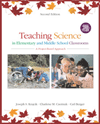 |  Teaching Children Science: A Project-Based Approach, 2/e Joe Krajcik,
University of Michigan - Ann Arbor
Charlene Czerniak,
University of Toledo
Carl Berger,
University of Michigan - Ann Arbor
What Are the Next Steps?
Chapter Summary- One of the most rewarding ways to teach science is a method known as project-based science.
- Project-based science has many benefits:
- Teachers find the work interesting and motivating.
- Teachers become lifelong learners.
- Classroom management is facilitated.
- Project-based science matches the reform efforts in science education.
- Learners develop deep, integrated understanding of content and process.
- Students learn to work together to solve problems.
- Project-based science promotes responsibility and independent learning.
- Project-based science is sensitive to the needs of a diverse group of students.
- Teachers can face a number of challenges when implementing project-based science for the first time:
- discomfort with science content knowledge;
- discomfort with the process of science;
- limited student experience which might cause some students to resist project work;
- the length of time required; and
- external pressures that can create tension.
- Professional growth is a continuous process throughout a teacher's career.
- Teachers can continue their professional growth by
- joining professional organizations
- attending conferences,
- subscribing to journals, and
- getting information from the World Wide Web.
- Teaching can be improved by reflecting on and engaging in inquiry about one's own teaching.
|
|



 2003 McGraw-Hill Higher Education
2003 McGraw-Hill Higher Education